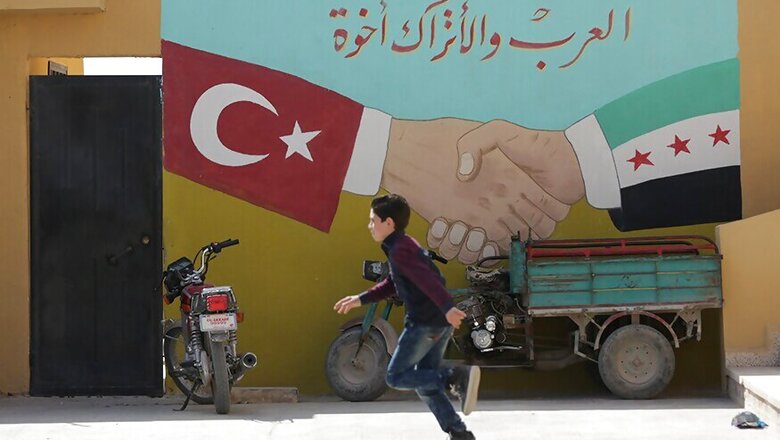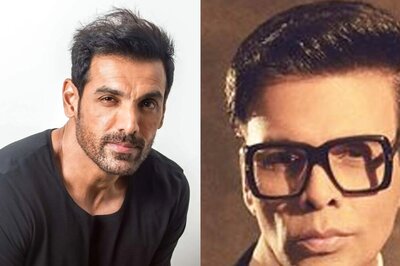
views
Ankara: Children returning to school in the northern Syrian city of al-Bab were handed a new textbook this term: "Türkçe Öğreniyorum" - "I am learning Turkish".
Turkish lessons, Turkish signposts, Turkish-trained police and most recently a Turkish post office all point to Turkey's deepening role in an area of northern Syria it captured from Islamic State (IS) with the help of Syrian rebels. Turkish administrators are even helping to run hospitals in the area.
Ankara has taken on a widening role in the 100-km (60-mile) stretch of territory seized in its eight-month-long "Euphrates Shield" operation, laying the foundations for long-term ties with an area that is of crucial strategic importance to Turkey.
Launched to drive IS away from the border, the operation also aimed to block further expansion by Syrian Kurdish groups that Ankara deems a threat to its national security.
With the Euphrates Shield region calm for months, Ankara says it wants to help recovery and to encourage a return of Syrian refugees, millions of whom fled the six-year-long war into Turkey.
But Turkish support is also consolidating the region's status as a Syrian opposition-held territory where Turkey-backed Syrian opposition groups are building their own government even as the forces of President Bashar al-Assad win back swathes of the country elsewhere.
"After Daesh (Islamic State) was expelled... we returned and the cities were suffering from large-scale destruction and general ruin," said Mohammad Karaz, director of education in al-Bab. "Some schools were wiped out entirely," he said.
"The restoration was done by our Turkish brothers who restored 10 schools, one of which we are sitting in today," he said during an interview at the Major Bulent al-Bayrak elementary school, named after a Turkish officer killed while fighting Islamic State for control of al-Bab.
"Arabs and Turks are siblings" reads a mural in the schoolyard. Turkish aid includes stationery, books and clothes.
Karaz said the schools were teaching a Syrian curriculum modified to remove the state's Baathist ideology. The decision to add Turkish was taken unanimously by Syrian education officials in the area, he said.
Turkish classes, taught by Syrians trained in Turkey, have started for pupils aged between six and nine. Explaining the decision, Karaz noted that two-thirds of al-Bab citizens had sought refuge in Turkey.
Turkish authorities had given assurances that qualifications from schools in the area would "be recognised in Turkey and students can apply to Turkish universities", he said.
ANKARA CRITICS SEE "TURKIFICATION"
A senior Turkish official said Ankara aimed to recreate "the conditions to bring life back to normal" in the area which is located northeast of the city of Aleppo and stretches to the western bank of the Euphrates River. Turkish support included health care, security, food and police training.
"Turkey wants the Syrians living (in Turkey) to return to their country ... However, it will continue to host the Syrians here and provide humane living conditions for the Syrians in the regions under its control for as long as necessary," the official told Reuters.
Turkish President Tayyip Erdogan, in a speech last weekend, said: "We don't have a wish to occupy these lands but we want the rightful owners to go back there."
Damascus has, however, long accused Turkey, a major backer of the Syrian opposition to Assad, of colonial ambitions in northern Syria. The front page of the pro-Damascus Lebanese newspaper al-Akhbar on Thursday declared that Ankara was undertaking the "Turkification" of the area.
Turkey's intervention was driven chiefly by concern over the growing sway of Syrian Kurdish groups seen by Ankara as an extension of the Kurdistan Workers Party (PKK), which has waged a three-decade long insurgency against the Turkish state.
The Euphrates Shield operation shattered the Syrian Kurds' hopes of joining up two Kurdish-dominated regions of northern Syria, where the war has allowed Kurdish militia to carve out their own autonomous regions.
The Syrian opposition's efforts to establish their own "interim government" in the Euphrates Shield area received a big boost this week when a Free Syrian Army (FSA) rebel group handed it control of a border crossing to Turkey.
The interim government's aims include drawing investment to move "the people from a state of war to work and building the region", said Khaled Aaba, a senior official with the Jabha Shamiya FSA group that handed over Bab al-Salama crossing.
Crediting Turkey for standing by "Syrians in their travails", he said Ankara was "actively participating in supporting administrative and service institutions in the area".
"The existence of (the interim) government better organises this relationship."
BUILDING A HOSPITAL, TRAINING POLICE
Turkey's support to the health sector has included repairing and expanding hospitals previously operated by the Syrian state.
Turkish administrators are working alongside Syrians at the Hikmeh Hospital in al-Bab, said Ahmad Aabo, a Syrian medical official in the city. Turkey's main project is a 200-bed hospital that will replace one destroyed during the war with IS.
"The companies taking control of the construction are Turkish, we don’t have companies capable of doing such a project," said Aabo, speaking to Reuters in a telephone interview from the city.
He said work on the hospital, which began a month ago, should be completed by New Year, comparing the rapid pace of the Turkish project with the 25 years it had taken to build its predecessor.
Turkish support for Syrian security forces has included training police officers who began deploying in the region in January. Abdel Razzak al-Laz, the head of the "National Police and General Security Forces", said 7,000 have now been deployed.
"Everyone wants the return of security and stability, wants to see a police patrol at night and during the day," said Laz, a police director when he defected to the opposition in 2012.
"The numbers are increasing, and there are continuous courses."



















Comments
0 comment